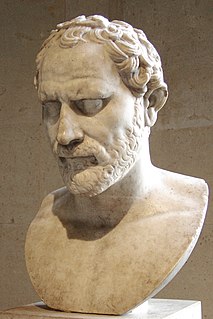A Quote by Demosthenes
There is one safeguard known generally to the wise, which is an advantage and security to all, but especially to democracies as against despots - suspicion.
Related Quotes
There are all kinds of devices invented for the protection and preservation of countries: defensive barriers, forts, trenches, and the like... But prudent minds have as a natural gift one safeguard which is the common possession of all, and this applies especially to the dealings of democracies. What is this safeguard? Skepticism. This you must preserve. This you must retain. If you can keep this, you need fear no harm.
We have to uphold the EU's core values. These days, people are nervous and uncertain because of security threats. In this kind of atmosphere, fear and hatred are on the rise. We need to safeguard security, but we also have to be vigilant and avoid handing over all power to those who say they are here to ensure security.
We have to realize that science is a double-edged sword. One edge of the sword can cut against poverty, illness, disease and give us more democracies, and democracies never war with other democracies, but the other side of the sword could give us nuclear proliferation, biogerms and even forces of darkness.
What is the good of your stars and trees, your sunrise and the wind, if they do not enter into our daily lives? They have never entered into mine, but into yours, we thought--Haven't we all to struggle against life's daily greyness, against pettiness, against mechanical cheerfulness, against suspicion? I struggle by remembering my friends; others I have known by remembering some place--some beloved place or tree--we thought you one of these.
Against the suffering which may come upon one from human relationships the readiest safeguard is voluntary isolation, keeping oneself aloof from other people. The happiness which can be achieved along this path is, as we see, the happiness of quietness. Against the dreaded external world one can only defend oneself by some kind of turning away from it, if one intends to solve the task by oneself.
That man is formed for social life is an observation which, upon our first inquiry, presents itself immediately to our view, and our reason approves that wise and generous principle which actuated the first founders of civil government, an institution which hat its origin in the weakness of individuals, and hath for its end the strength and security of all; and so long as the means of effecting this important end are thoroughly known and religiously attended to government is one of the richest blessings to mankind, and ought to be held in the highest veneration










































